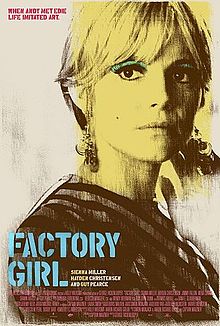Oh God. Factory Girl.
Released in 2006, Factory Girl was a biopic about Edie Sedgwick, the tragic model/actress/artist who was briefly both Andy Warhol’s muse and one of the most famous women in America. Before I talk too much about this film, I should probably admit that I’m probably the worst possible person to review a movie about Edie Sedgwick.
Why?
Allow me to repost something that I wrote when I reviewed Edie’s final film, Ciao Manhattan:
“In the late 60s, Edie Sedgwick was a model who was briefly the beautiful face of the underground. Vogue called her a “youthquaker.” She made films with Andy Warhol, she dated the rich and the famous and for a brief time, she was one of the most famous women in America. But a childhood full of tragedy and abuse had left Edie fragile and unprepared to deal with the pressures of being famous. She was fed drugs by those who claimed to care about her, she had numerous mental breakdowns, and, when she was at her most vulnerable, she was pushed away and rejected by the same people who had loved her when she was on top of the world. Edie died because, when she asked for help, nobody was willing to listen.
I guess I should explain something. I don’t believe in reincarnation but if I did, I would swear that I was Edie Sedwick in a past life. Of all the great icons of the past, she, Clara Bow, andVictoria Woodhull are the ones to whom I feel the closest connection. (Edie is the reason why, for the longest time, I assumed I would die when I was 28. But now I’m 29, so lucky me.)”
(Incidentally, I wrote that two years ago and I’m still alive so, once again, lucky me.)
Anyway, my point is that I’m always going to be a hundred times more critical of a film about Edie Sedgwick as I would be about any other film. If you’re already guessing that I didn’t particularly care for Factory Girl, you’re right. However, there are some people whose opinions I respect and some of them love this film.
Anyway, Factory Girl is a biopic that’s structured so conventionally that it even opens with Edie (played by Sienna Miller) narrating her story to an unseen interviewer. I can count on one hand the number of successful biopics that have featured someone telling the story of their life to an unseen interviewer. It’s a conventional and kind of boring technique. Anyway, the film follows all of the expected beats. Edie arrives in New York. Edie is spotted by Andy (Guy Pearce). Edie makes films with Warhol. Her famous dance in Vinyl is recreated. Edie becomes Andy’s platonic girlfriend but then, she meets and falls in love with Bob Dylan…
Oh, sorry. He’s not actually Bob Dylan. According to the credits, his name is Folksinger. He says Bob Dylan type stuff. He rides around on a motorcycle. He carries a harmonica. Oh, and he’s played by Hayden Christensen.
See, the first half of Factory Girl is actually not bad. Sienna Miller gives a pretty good performance as Edie, even if she never comes close to capturing Edie’s unforced charisma. Despite being several years too old, Guy Pearce is also credible as Andy Warhol. The film itself is full of crazy 60s clichés but, even so, that’s not always a terrible thing. Some of those 60s clichés are a lot of fun, if they’re presented with a little imagination.
But then Hayden Christensen shows up as Bob Dylan and the film loses whatever credibility it may have had. Hayden, who gave his best performance when he played a soulless and largely empty-headed sociopath in Shattered Glass, is totally miscast as a musician who once said that if people really understood what his songs were about, he would have been thrown in jail. The film attempts to portray Dylan and Warhol as two men fighting for Edie’s soul but Christensen is so outacted by Guy Pearce that it’s never really much of a competition. Even though the film makes a good case that Edie’s relationship with Andy was ultimately self-destructive, Guy Pearce is still preferable to Hayden Christensen trying to imitate Dylan’s distinctive mumble.
Anyway, Factory Girl doesn’t really work. Beyond the odd casting of Hayden Christensen, Factory Girl is too conventionally structured. In its portrayal of the Factory and life in 1960s New York, the film never seems to establish a life beyond all of the familiar clichés. (Before anyone accuses me of contradicting myself, remember that I said that the old 60s clichés are fun if they’re presented with a little imagination. That’s a big if.) At no point, while watching the film, did I feel as if I had been transported back to the past. If you want to learn about Edie Sedgwick, your best option is to try to track down her Warhol films.


